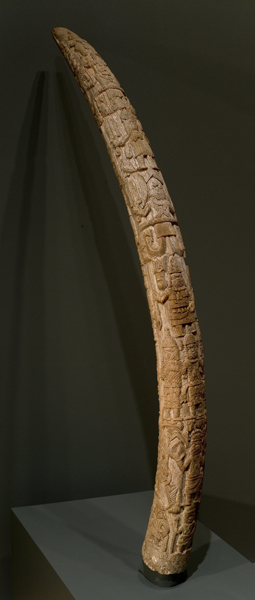Tusk for the Royal Benin (Edo) Ancestral Shrine

Art production in nineteenth-century Benin (Edo), located in present-day southwestern Nigeria, served to honor the country’s ancestral past and to propagate the king’s spiritual and political power. This ivory tusk was probably commissioned by Oba (King) Adolo, who fostered a revival of fine ivory carving. The material was not only valued for its ease of carving, but also for its whiteness associated with the purity of chalk and with Olokun, the god of the sea, wealth, fertility, happiness, and abundance. The use of ivory furthermore symbolized an elephant’s esteemed characteristics of leadership, sagacity, persistence, and physical power.
The unidentified artists belonged to a hereditary ivory carvers’ guild called Igbesanmwan, meaning “they who write on ivory.” Igbesanmwan carvers worked collaboratively to embellish tusks, using adzes and knives for carving, and leaves and other abrasive materials for sanding. The objects’ iconographic program was inspired by deities, who in turn provided the artists with guidance and spiritual protection. Carvings may be read in rows from the bottom to the top of the tusk, though complete narratives are not depicted within the bands. The carved symbols and figures serve instead to remind the viewer of Edo history and mythology. Once complete, the ivory tusks were incorporated into altar decoration within households and the royal palace to honor deceased male family members. The Oba in contemporary Benin continues to commission tusks today to honor his predecessors.
This work is currently on view in the Elizabeth Rickey Bevington and Leila Hammond Duncan Gallery on the fourth floor of the museum.
Lia Dawley ’12
Student Curatorial Assistant